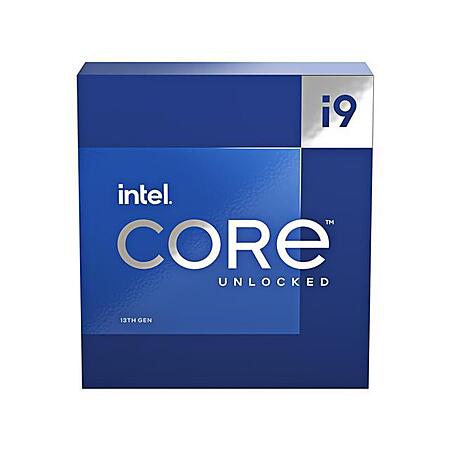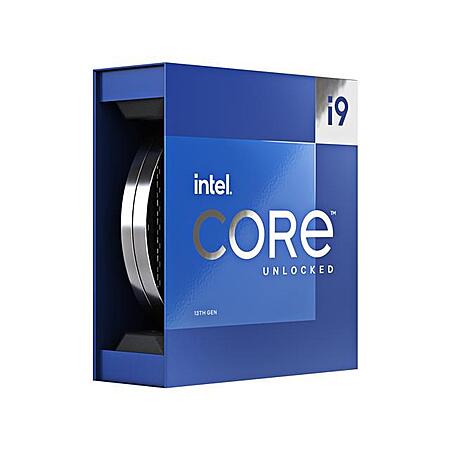https://www.newegg.com/intel-core...6819118412
Newegg has the Intel Core i9-13900K - Core i9 13th Gen Raptor Lake 24-Core (8P+16E) P-core Base Frequency: 3.0 GHz E-core Base Frequency: 2.2 GHz LGA 1700 125W Intel UHD Graphics 770 Desktop Processor - BX8071513900K on sale for $399.99 after $40 off using the promo code
FTTPDU8235.Simply add the processor to cart (must be sold and shipped by newegg)
, and enter and apply the promo code in the box on the right side of the cart beneath the order summary which says "Apply Promo Code". Shipping is free.
This is the cheapest a 13900k or 13900kf has ever officially gone on sale for (not including pm's or combos). It also qualifies for newegg's "FantasTech Price Protection", details can be found here:
https://www.newegg.com/promotions...index.html 




Leave a Comment
10 Comments
Sign up for a Slickdeals account to remove this ad.
The 13900k is functionally a slightly slower clocked 14900k, the 14th gen "raptor lake refresh" cpus have no significant architectural changes and cost substantially more. Intel apo is also available for the 13900k, rather than being limited to 14th gen like intel initially attempted to get away with. The 13900k has 24 cores and 32 threads, and consumes an absolutely ludicrous amount of power under full load. While gaming performance is very good (only slightly slower than the 7800x3d on average), this is not a cpu to consider if your primary use cases are gaming. You should only consider this cpu if you have cpu dependent productivity workloads which demand absolutely enormous amounts of multithreaded performance, this cpu is overkill for any other use cases. The uhd 770 igpu in the 13900k has two of intel's multi format codec engines for intel quicksync, making it an excellent option for video editing, encoding, and transcoding. Here's the pugetsystems 14th gen content creation review for reference (includes the 13900k for comparison): https://www.pugetsystem
Cooling the 13900k is very difficult, while a top tier air cooler can technically work, to avoid thermal throttling you'll realistically want a 360mm aio. You should also make sure whatever motherboard you slot the 13900k into has a substantial vrm, low tier boards will likely struggle with the 13900k. Speaking of motherboards, there have been reliability concerns with the 13900k due to the power settings set by motherboard vendors in the past. You should make sure your bios is updated to the latest version, and preferably use the intel default "extreme" power delivery profile.
Lga 1700 is a dead-end platform, with newer generations of intel cpus being on the upcoming lga 1851 socket. Therefore, those who prefer upgradability would be much better off going with amd (especially with the upcoming release of zen 5). Amd's zen 4 cpus (and presumably zen 5 as well) also have far better power efficiency than intel's raptor lake (refresh). For the vast majority of people building a new system, I'd recommend am5, especially since zen 5 will be releasing soon. That being said, intel cpus still have better performance in specific productivity applications, and for those who already have a lga 1700 motherboard with a 12th gen (or weak 13-14th gen) cpu, the 13900k is a slot in upgrade to what's functionally the highest tier performance which will ever be available for the lga 1700 platform.
Ultimately, for those who would meaningfully benefit from the 13900k's productivity performance in the near term and already have a lga 1700 motherboard capable of handling it, this is a pretty good deal. Otherwise, I'd recommend most people wait until zen 5 releases.
The 13900k is functionally a slightly slower clocked 14900k, the 14th gen "raptor lake refresh" cpus have no significant architectural changes and cost substantially more. Intel apo is also available for the 13900k, rather than being limited to 14th gen like intel initially attempted to get away with. The 13900k has 24 cores and 32 threads, and consumes an absolutely ludicrous amount of power under full load. While gaming performance is very good (only slightly slower than the 7800x3d on average), this is not a cpu to consider if your primary use cases are gaming. You should only consider this cpu if you have cpu dependent productivity workloads which demand absolutely enormous amounts of multithreaded performance, this cpu is overkill for any other use cases. The uhd 770 igpu in the 13900k has two of intel's multi format codec engines for intel quicksync, making it an excellent option for video editing, encoding, and transcoding. Here's the pugetsystems 14th gen content creation review for reference (includes the 13900k for comparison): https://www.pugetsystems.com/labs...on-review/ [pugetsystems.com]
Cooling the 13900k is very difficult, while a top tier air cooler can technically work, to avoid thermal throttling you'll realistically want a 360mm aio. You should also make sure whatever motherboard you slot the 13900k into has a substantial vrm, low tier boards will likely struggle with the 13900k. Speaking of motherboards, there have been reliability concerns with the 13900k due to the power settings set by motherboard vendors in the past. You should make sure your bios is updated to the latest version, and preferably use the intel default "extreme" power delivery profile.
Lga 1700 is a dead-end platform, with newer generations of intel cpus being on the upcoming lga 1851 socket. Therefore, those who prefer upgradability would be much better off going with amd (especially with the upcoming release of zen 5). Amd's zen 4 cpus (and presumably zen 5 as well) also have far better power efficiency than intel's raptor lake (refresh). For the vast majority of people building a new system, I'd recommend am5, especially since zen 5 will be releasing soon. That being said, intel cpus still have better performance in specific productivity applications, and for those who already have a lga 1700 motherboard with a 12th gen (or weak 13-14th gen) cpu, the 13900k is a slot in upgrade to what's functionally the highest tier performance which will ever be available for the lga 1700 platform.
Ultimately, for those who would meaningfully benefit from the 13900k's productivity performance in the near term and already have a lga 1700 motherboard capable of handling it, this is a pretty good deal. Otherwise, I'd recommend most people wait until zen 5 releases.
The 13900k is functionally a slightly slower clocked 14900k, the 14th gen "raptor lake refresh" cpus have no significant architectural changes and cost substantially more. Intel apo is also available for the 13900k, rather than being limited to 14th gen like intel initially attempted to get away with. The 13900k has 24 cores and 32 threads, and consumes an absolutely ludicrous amount of power under full load. While gaming performance is very good (only slightly slower than the 7800x3d on average), this is not a cpu to consider if your primary use cases are gaming. You should only consider this cpu if you have cpu dependent productivity workloads which demand absolutely enormous amounts of multithreaded performance, this cpu is overkill for any other use cases. The uhd 770 igpu in the 13900k has two of intel's multi format codec engines for intel quicksync, making it an excellent option for video editing, encoding, and transcoding. Here's the pugetsystems 14th gen content creation review for reference (includes the 13900k for comparison): https://www.pugetsystem
Cooling the 13900k is very difficult, while a top tier air cooler can technically work, to avoid thermal throttling you'll realistically want a 360mm aio. You should also make sure whatever motherboard you slot the 13900k into has a substantial vrm, low tier boards will likely struggle with the 13900k. Speaking of motherboards, there have been reliability concerns with the 13900k due to the power settings set by motherboard vendors in the past. You should make sure your bios is updated to the latest version, and preferably use the intel default "extreme" power delivery profile.
Lga 1700 is a dead-end platform, with newer generations of intel cpus being on the upcoming lga 1851 socket. Therefore, those who prefer upgradability would be much better off going with amd (especially with the upcoming release of zen 5). Amd's zen 4 cpus (and presumably zen 5 as well) also have far better power efficiency than intel's raptor lake (refresh). For the vast majority of people building a new system, I'd recommend am5, especially since zen 5 will be releasing soon. That being said, intel cpus still have better performance in specific productivity applications, and for those who already have a lga 1700 motherboard with a 12th gen (or weak 13-14th gen) cpu, the 13900k is a slot in upgrade to what's functionally the highest tier performance which will ever be available for the lga 1700 platform.
Ultimately, for those who would meaningfully benefit from the 13900k's productivity performance in the near term and already have a lga 1700 motherboard capable of handling it, this is a pretty good deal. Otherwise, I'd recommend most people wait until zen 5 releases.
First off, the 13900k is significantly more expensive than cpus which are only slightly worse and in some cases even slightly better in terms of gaming performance. The prime example is the 7800x3d, which goes on sale for $340 pretty regularly, and actually beats the 13900k in gaming perfromance by a couple percentage points on average. If you need stronger multithreaded performance than the 7800x3d provides, the 7900x3d goes on sale for ~$310, and is only slightly slower than the 13900k in gaming. If you really want to stick with intel, in terms of gaming performance the 13700k, which goes on sale at ~$300, is only ~5% slower in gaming than the 13900k.
Second, the 13900k uses an enormous amount of power, and is highly inefficient. Compared to a 7800x3d, it oftentimes will use upwards of 75w+ more power while gaming to achieve worse gaming performance. Amd's zen 4 cpus have a massive advantage in power efficiency.
Third, lga 1700 is a dead end platform. Future intel cpus will be on the lga 1851 platform, so if you want to upgrade your computer in the future you'll also need to replace your motherboard. In contrast, amd's am5 platform supports the upcoming zen5 cpus, and is essentially guaranteed to support the 2 generations in the future zen 6 cpus as well. That means if you build an am5 system now, you'll be able to slot in a two generations newer cpu years down the line without needing to replace your motherboard or ram.
It's also important to keep in mind that these comparisons of cpu performance are at 1080p using a rtx 4090. In terms of the configs most gamers will actually have, the vast majority of people wouldn't benefit from more than ~7700x level cpu gaming performance for a few years at least.
In conclusion, while the 13900k cpu has top tier gaming performance, it's simply not a good purchase if your primary use cases don't include heavily multithreaded productivity workloads.
Sign up for a Slickdeals account to remove this ad.
Leave a Comment